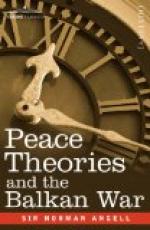“Peace” in the Balkans under the Turkish System—The inadequacy of our terms—The repulsion of the Turkish invasion—The Christian effort to bring the reign of force and conquest to an end—The difference between action designed to settle relationship on force and counter action designed to prevent such settlement—The force of the policeman and the force of the brigand—The failure of conquest as exemplified by the Turk—Will the Balkan peoples prove Pacifist or Bellicist; adopt the Turkish or the Christian System?
Had we thrashed out the question of war and peace as we must finally, it would hardly be necessary to explain that the apparent paradox in Answer No. 4 (that war is futile, and that this war will have immense benefits) is due to the inadequacy of our language, which compels us to use the same word for two opposed purposes, not to any real contradiction of fact.
We called the condition of the Balkan peninsula “Peace” until the other day, merely because the respective Ambassadors still happened to be resident in the capitals to which they were accredited.
Let us see what “Peace” under Turkish rule really meant, and who is the real invader in this war. Here is a very friendly and impartial witness—Sir Charles Elliot—who paints for us the character of the Turk as an “administrator":—
“The Turk in Europe has an overweening sense of his superiority, and remains a nation apart, mixing little with the conquered populations, whose customs and ideas he tolerates, but makes little effort to understand. The expression indeed, ‘Turkey in Europe’ means indeed no more than ‘England in Asia,’ if used as a designation for India.... The Turks have done little to assimilate the people whom they have conquered, and still less, been assimilated by them. In the larger part of the Turkish dominions, the Turks themselves are in a minority.... The Turks certainly resent the dismemberment of their Empire, but not in the sense in which the French resent the conquest of Alsace-Lorraine by Germany. They would never use the word ‘Turkey’ or even its oriental equivalent, ‘The High Country’ in ordinary conversation. They would never say that Syria and Greece are parts of Turkey which have been detached, but merely that they are tributaries which have become independent, provinces once occupied by Turks where there are no Turks now. As soon as a province passes under another Government, the Turks find it the most natural thing in the world to leave it and go somewhere else. In the same spirit the Turk talks quite pleasantly of leaving Constantinople some day, he will go over to Asia and found another capital. One can hardly imagine Englishmen speaking like that of London, but they might conceivably speak so of Calcutta.... The Turk is a conqueror and nothing else. The history of the Turk is a catalogue of battles. His contributions to art, literature, science and religion, are practically nil. Their desire has not been to instruct,




